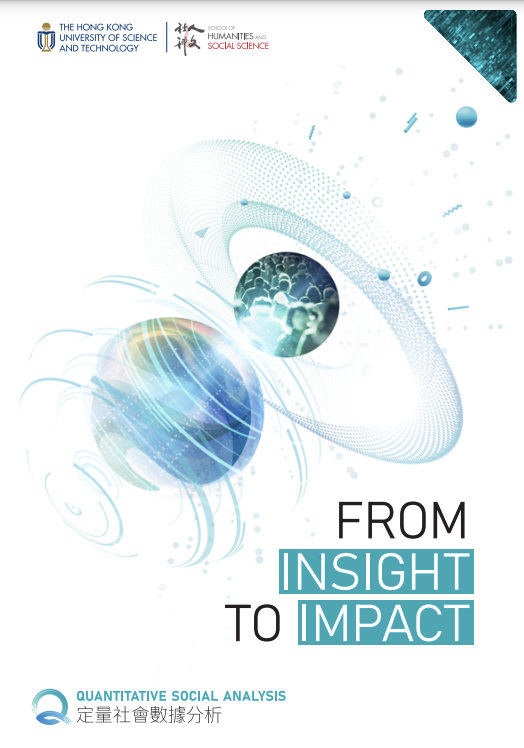
Introduction
The Quantitative Social Analysis UG major in the HKUST Division of Social Science prepares students for the rapidly growing number of positions in business, government, and the non-profit sector that involve the analysis of social data and interpretation and presentation of results. In all of these sectors, rising demand for employees with relevant skills is being driven by the rapid increases in the amount and complexity of social data being collected online and by surveys, or otherwise being made available.
Please see this video for an overview of the QSA program and this video for a general introduction to undergraduate programs at the HKUST School of Humanities and Social Science.
▌Features and Goals
The major provides an integrated training in social science theory and evidence, statistical methods, the analysis of social data, and the interpretation and presentation of results. The curriculum is described in detail in our page on program requirements.
The program is ideal for students with quantitative skills who want to apply them in the study of topics related to society, politics, or the economy. Our training focuses on methods that have been developed specifically for the quantitative analysis of social data. Students learn how to apply these methods to complex data sets in a way that accounts for the unique challenges associated with the analysis of social data, and reflects an understanding of existing social theory and evidence. They learn how to identify a research question, collect and manage complex social data, carry out analysis, and then develop, test, and refine hypotheses informed by social science theory.
Topical and methodological electives allows students to tailor their training to their interests and career plans. Students who plan to work after graduation have the flexibility to focus their methodological electives that offer hands-on experience applying cutting edge methods to the analysis of social data. Students who plan postgraduate graduate can focus on more theoretical courses, including advanced courses in the Math department and other campus units.
▌Minors and Double-Majors
By double-majoring or minoring, many Quantitative Social Analysis students acquire additional specialized training in other areas that complements the training they receive in our program. Students are currently minoring in China Studies, Business, Big Data Technology, Environmental Science, and Psychological and Behavioral Science. Computer Science and Engineering also offers a minor in Information Technology. The Department of Math offers a minor in Actuarial Mathematics that also may be of interest to QSA students.
Some students double-major in the BSc in Computer Science program offered by the Department of Computer Science and Engineering. As of fall 2020, two have already graduated, two are currently in the program, and other students have applications pending. The Computer Science program is designed to facilitate double-majors from across HKUST and students normally apply to it after the end of their first year in their home program.
▌Internships
Students have had internships with large and small companies, the government, and the non-profit sector. Most students begin to find internships during their third year, thus one-half (17 of 34) of the students who began their 4th year in fall 2020 had at least one internship by that time. Increasing numbers of students find internships in their second year, thus nearly one-third (9 of 31) of the students who began their 3rd year in fall 2020 have had an internship. Six students have already had two internships: the 26 students who have had internships have had a total of 32 internships. Nearly two-thirds of the internships done by QSA students were in the business sector. The remainder were distributed across the non-profit, government, and education sectors. These numbers only include internships where the students’ responsibilities included application of skills learned in QSA. The actual number of students who had internships or had other jobs related to QSA will actually be higher because not all students who find internships report them to us, and even more students have had jobs or internships that we do not include here because their responsibilities were not QSA-related.
▌Social Science at HKUST
The HKUST Division of Social Science is widely considered one of the strongest in Asia. It includes more than 30 faculty members in five areas: Economics; Sociology; Political Science; Psychology; and Geography. It is especially noted for its strength in quantitative research and training. Graduates of its MPhil programs routinely go on to top PhD programs overseas, and some of them now have faculty positions at institutions such as Yale and Penn. PhD graduates are on the faculty of top universities in Hong Kong and the mainland, some after having postdocs at such top overseas institutions such as Princeton.
HKUST also has a new and rapidly growing Division of Public Policy that has faculty who teach courses in the Division of Social Science.
▌Program Brochure
Questions? Please email us at qsapgm@ust.hk.
